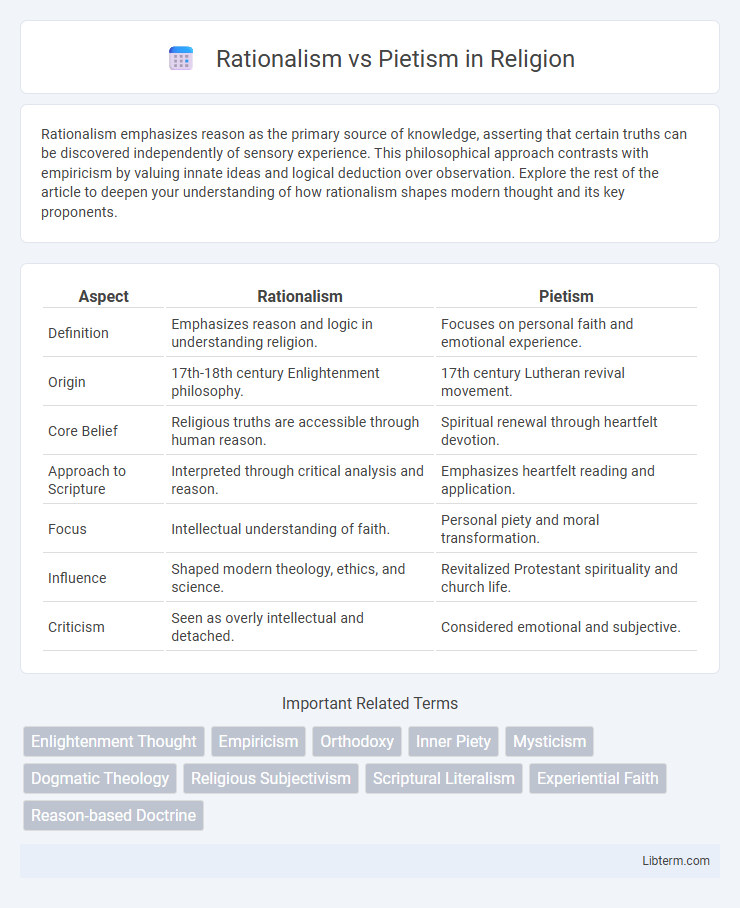Rationalism emphasizes reason as the primary source of knowledge, asserting that certain truths can be discovered independently of sensory experience. This philosophical approach contrasts with empiricism by valuing innate ideas and logical deduction over observation. Explore the rest of the article to deepen your understanding of how rationalism shapes modern thought and its key proponents.
Table of Comparison
| Aspect | Rationalism | Pietism |
|---|---|---|
| Definition | Emphasizes reason and logic in understanding religion. | Focuses on personal faith and emotional experience. |
| Origin | 17th-18th century Enlightenment philosophy. | 17th century Lutheran revival movement. |
| Core Belief | Religious truths are accessible through human reason. | Spiritual renewal through heartfelt devotion. |
| Approach to Scripture | Interpreted through critical analysis and reason. | Emphasizes heartfelt reading and application. |
| Focus | Intellectual understanding of faith. | Personal piety and moral transformation. |
| Influence | Shaped modern theology, ethics, and science. | Revitalized Protestant spirituality and church life. |
| Criticism | Seen as overly intellectual and detached. | Considered emotional and subjective. |
Introduction to Rationalism and Pietism
Rationalism emphasizes reason and empirical evidence as the primary sources of knowledge, rejecting reliance on religious dogma and supernatural explanations in understanding truth. Pietism, emerging within Lutheranism in the 17th century, prioritizes personal faith, heartfelt devotion, and spiritual renewal over formal theological doctrines. This contrast highlights Rationalism's focus on intellectual inquiry versus Pietism's emphasis on experiential religion and moral transformation.
Historical Background of Both Movements
Rationalism, emerging prominently in the 17th century during the Enlightenment, emphasized reason and knowledge as the primary sources of authority and legitimacy, influencing philosophers such as Descartes and Spinoza. Pietism arose in the late 17th century within Lutheranism as a reaction to perceived spiritual deadness, prioritizing personal faith, devotional life, and moral reform, with key figures like Philipp Jakob Spener. Both movements significantly shaped European religious and intellectual landscapes by challenging established orthodoxies through reason and heartfelt piety respectively.
Core Beliefs of Rationalism
Rationalism emphasizes reason and evidence as the primary sources of knowledge, asserting that truth can be discovered through logical deduction and scientific inquiry rather than religious revelation. It prioritizes human intellect and critical thinking to understand the world, often questioning traditional doctrines and supernatural explanations. Core beliefs of Rationalism include the trust in empirical evidence, the rejection of faith-based claims without rational support, and the view that morality and ethics can be grounded in human reason.
Foundational Doctrines of Pietism
Pietism emphasizes personal faith, heartfelt devotion, and practical Christian living as foundational doctrines, contrasting with Rationalism's focus on reason and intellectual assent. Core Pietist beliefs include the necessity of spiritual rebirth, the authority of Scripture experienced through the Holy Spirit, and the pursuit of sanctification via daily piety and community. This movement shaped Lutheran theology by valuing experiential faith and moral transformation over mere doctrinal correctness.
Key Figures in Rationalism and Pietism
Key figures in Rationalism include Rene Descartes, who emphasized reason as the primary source of knowledge, and Baruch Spinoza, known for his systematic approach to philosophy and ethics. Pietism's central leaders, such as Philipp Jakob Spener and August Hermann Francke, promoted heartfelt devotion and practical Christianity as a response to formalism in the church. These influential thinkers shaped distinct theological and philosophical movements, with Rationalism relying on logic and evidence, and Pietism focusing on personal faith and spiritual renewal.
Rationalism’s Impact on Theology
Rationalism reshaped theology by emphasizing human reason as the primary source of knowledge, challenging traditional doctrines based on faith and revelation. It promoted critical examination of scriptures, encouraging interpretative frameworks aligned with logic and empirical evidence. This shift led to modern theological movements that prioritize moral philosophy and ethical questions over orthodox dogma.
Pietism’s Influence on Christian Practice
Pietism significantly shaped Christian practice by emphasizing personal faith, heartfelt devotion, and practical holiness over mere doctrinal knowledge, contrasting with Rationalism's focus on human reason and intellectual understanding of religion. This movement promoted small group Bible studies, personal Bible reading, and a vibrant communal worship experience designed to foster spiritual renewal and ethical living. Pietism's influence led to the revitalization of Protestant churches in the 17th and 18th centuries, encouraging active charity, missionary work, and a deeper integration of faith into daily life.
Contrasts in Spiritual Authority and Experience
Rationalism emphasizes reason and individual critical thinking as the authority in spiritual matters, prioritizing intellectual understanding and systematic theology. Pietism, by contrast, centers on personal religious experience and heartfelt devotion as the source of spiritual authority, valuing emotional engagement and inner transformation. This contrast highlights a fundamental divide: Rationalism trusts cognitive clarity and objective truth, while Pietism relies on subjective, experiential faith for spiritual authenticity.
Legacy and Modern Relevance
Rationalism emphasized reason as the primary source of knowledge, significantly shaping Enlightenment thought and modern scientific inquiry, while Pietism underscored personal faith and emotional experience, influencing contemporary evangelical movements and spiritual revival. The legacy of Rationalism persists in secular education, critical thinking, and empirical methodologies, whereas Pietism's impact is evident in modern Christian worship styles and the emphasis on individual spirituality. Both movements contribute to ongoing dialogues about the balance between reason and faith in shaping ethical, educational, and religious frameworks.
Conclusion: Evaluating Rationalism vs. Pietism
Rationalism emphasizes reason and intellectual analysis as the primary means to attain knowledge, while Pietism prioritizes heartfelt faith and personal religious experience. Evaluating Rationalism versus Pietism reveals a fundamental tension between objective understanding and subjective spirituality, each offering distinct paths to truth and spiritual fulfillment. The integration of both approaches can provide a balanced framework that values critical thought alongside authentic devotion.
Rationalism Infographic

 libterm.com
libterm.com